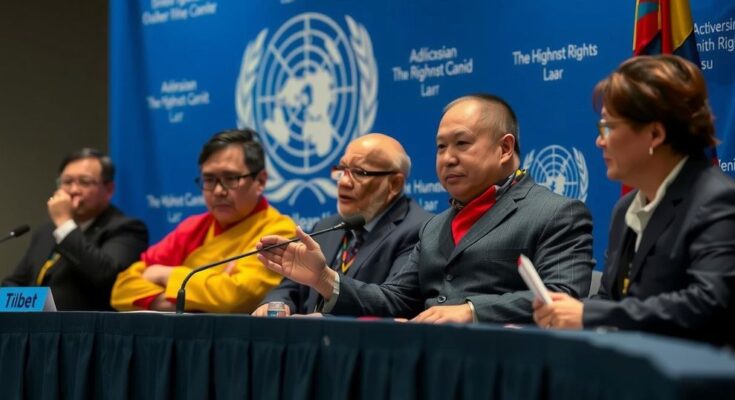Tibetan advocates gathered at the UN Human Rights Council to spotlight China’s suppression of the Tibetan language and school closures in Tibet. Prominent speakers discussed the risks faced by those advocating for language rights, emphasizing the adverse educational policies and cultural implications. The event underscored the urgent need for international recognition and action regarding Tibetan rights.
In a compelling side event at the United Nations Human Rights Council in Geneva, Tibetan advocates and supporters raised their voices against China’s suppression of the Tibetan language and the troubling trend of school closures across Tibet. The Helsinki Foundation for Human Rights hosted the event, with Kai Mueller from the International Campaign for Tibet moderating a panel that included prominent speakers like Palmo Tenzin and Tenzin Choekyi, who captivated a diverse audience from various UN missions with their testimony. Tenzin Choekyi opened the discussion by illuminating the historical protests of Tibetans fighting for language rights and the dire repercussions they face, including detention and torture. In a poignant expression of urgency, she revealed the sacrifices made by community leaders and ordinary citizens in their quest for cultural preservation, which often leads to severe consequences. Palmo Tenzin painted a heart-wrenching picture of the oppressive climate in Tibet that quashes open discussion, particularly about education policies that threaten Tibetan culture and language. “Tibetan children lose their mother tongue, are unable to communicate with relatives, and cannot access their culture and history,” she lamented, underscoring the critical state of education in Tibet. Gloria Montgomery expanded on these themes by warning about the severe consequences of China’s school closures, underscoring that such actions violate international education rights obligations. She reminded the audience that China is bound by international law to provide education in Tibetan, a commitment outlined in various covenants that the People’s Republic of China has ratified. In a notable attendance, Chinese representatives participated actively, challenging the testimony without delegating to proxy organizations. Their denial of the advocates’ accounts was indicative of Beijing’s ongoing dismissal of the Tibetan situation and highlights their refusal to engage in meaningful dialogue. Tencho Gyatso, President of the International Campaign for Tibet, praised the panelists for their courage in exposing the harsh realities faced under Chinese governance. “Instead of lying to the world, China must acknowledge that Tibetans have every right to be educated in their mother tongue and stop trying to forcibly erase Tibet’s rich heritage,” he asserted passionately. The event’s resonance was heightened by a recent declaration from 100 Tibetan and Himalayan scholars directed at UN High Commissioner for Human Rights Volker Turk, who expressed alarm regarding China’s systematic closure of schools in Tibet. Their appeal called for immediate action against the forced assimilation policies threatening Tibetan heritage. This UN gathering is a pivotal moment for Tibetan advocates, who persistently strive for recognition of their human rights and the safeguarding of their language and culture amidst intensifying repression. Their ongoing struggle is a testament to the resilience and enduring spirit of a people fighting for their rightful voice.
The event organized at the UN Human Rights Council symbolized a crucial platform for Tibetan advocates to address the alarming realities of language suppression by the Chinese government. The ongoing closures of Tibetan schools pose significant threats to the cultural identity and linguistic heritage of the Tibetan people. This situation has mobilized activists and scholars to call for international attention and intervention to preserve their rights.
The gathering at the UN highlighted the urgent need for recognition of Tibetan rights, particularly in the face of China’s oppressive measures against their language and culture. Advocates emphasized the dire consequences of education policies, urging international accountability while calling for an end to forced assimilation practices. The event served to reaffirm their commitment to safeguarding their rich heritage amidst escalating suppression.
Original Source: www.aninews.in



